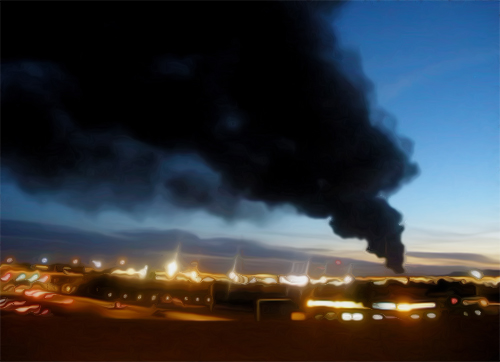
The fatal toll from the October 24 explosion and partial building collapse at a Mexican border candy factory now stands at eight workers. The death of Miguel Armando Reyes Castro was announced this week after the critically injured worker succumbed in a Guadalajara hospital where he had been transferred for treatment of severe burns sustained from the pre-Halloween disaster that struck the Dulces Blueberry factory hundreds of miles to the north in Ciudad Juarez.
A malfunctioning boiler, gas leak or human error in mixing chemicals is suspected as the cause of the tragedy at the Gema industrial park. The results of an investigation jointly conducted by the Chihuahua State Prosecutor (FGE), the federal attorney general’s office and a fire specialist employed by Blueberry’s insurance company are expected to be publicized soon.
But recent statements by high-ranking Mexican officials indicate that Blueberry could be off the hook for any legal responsibility stemming from worker deaths and injuries.
“Everything seems to indicate that this was an accident in which there was no malice to indicate that it was a premeditated situation,” said FGE spokesman Arturo Sandoval Figon this week.
Two workers died on the day of the disaster, but the death toll has steadily mounted in recent days.
The Blueberry plant manufactures Sunrise Confections candy products which are sold in large retail outlets in the United States for El Paso-based Mount Franklin Foods, which in turn is a subsidiary of the Elamex company. Blueberry’s workers are not directly employed by the candy maker, instead laboring for the ELI labor sub-contracting agency.
October’s disaster exposed glaring holes in the emergency response capabilities of an industrial city of more than one million people, as well as long-standing irregularities and alleged illegalities in the worker health, safety and environmental records of Blueberry.
Legislators from the PAN and PRI political parties, members of the health care profession, activists from non-governmental human rights and labor advocacy organizations, victims’ relatives, and even industry specialists added their voices to a torrent of criticisms and questions that flowed in the aftermath of the tragedy. No union, however, has stepped forward to speak on behalf of the workers.
Continued news coverage has reported on the absence of local medical facilities to treat severe burn victims, some of whom had to be transferred to hospitals long distances from Ciudad Juarez; the shortage of ambulances in a city just barely emerging from years of hyper-violence; the paucity of health and safety inspectors to cover 326 export industry plants, or maquiladoras, employing an estimated 227,978 workers, not to mention the more than 8,000 other businesses open in the city; and problems with the 066 emergency response number.
Rapid treatment of burn patients is critical, said Leticia Chavarria Villa, head of the Citizens Medical Committee, a Ciudad Juarez non-governmental group representing doctors and health care professionals.
“The first 6 to 12 hours are basic for the recuperation of patients,” Chavarria said. “Personnel and resources should be on hand in order to initiate adequate treatment in these types of cases.”
Added Chavarria: “We are not prepared for this type of emergency and now more than ever, we are even worse off than when the violence erupted.”
According to local press reports, only four of the 24 ambulances in the Red Cross’ Ciudad Juarez fleet were operable on the day of the industrial disaster. Of the remaining vehicles, five were completely broken down and 15 others lacked gasoline.
Two hours before the blast, workers and neighbors of the Blueberry plant reportedly called the 066 emergency line to inform authorities about a “penetrating odor” emanating from the plant. Local police then responded to the call but allegedly left the premises without even informing other officials about their visit.
On October 28, relatives of an unidentified Blueberry worker filed a complaint with the Chihuahua State Human Rights Commission.
Economist Alfonso Arenaza of the Caseem labor subcontracting firm said the condition of the city’s industrial infrastructure was another issue at stake.
“The old industrial parks need vigilance and attention,” Arenaza maintained. “In fact, Juarez has lost its attractiveness because of the condition of these parks which now don’t comply with the requirements. (Gema) is one of the oldest parks, and it demands greater attention and more constant revisions by the maquiladoras and Civil Protection…”
More information on Blueberry’s history in Ciudad Juarez has recently come to light. A Mexican Social Security Institute (IMSS) official told a local reporter that Blueberry had been slapped with fines by the IMSS and other government agencies during the last two years but had either failed to comply with all the necessary rectifications or appealed the government’s findings.
Marco Antonio Hernandez Gomez, IMSS director of labor and environmental safety in Ciudad Juarez, said his agency found malfunctioning alarms, overly loud machines, blocked exits and other violations at Blueberry.
Hernandez added that the federal Labor Secretariat had fined the company for 15-17 labor infractions, which Blueberry appealed, while the Federal Attorney General for Environmental Protection, had levied a fine on the company for illegally dumping wastewater on land outside the plant.
Hernandez said Blueberry had been a “high-risk enterprise” during the last decade, adding that the IMSS worked with the company for an entire year to correct unsafe conditions but with only mixed results.
“As a year went by, we saw a company that didn’t have much will so we pulled back a little, though we continued supporting them” Hernandez said. “But we saw that this was a company that did not want to work for the safety of its workers.”
Other recent news reports have focused on property and patent lawsuits over Blueberry on both sides of the border, company ownership changes, the web of corporate entities and subcontractors surrounding the candy manufacturing operation, and the links of prominent Ciudad Juarez-Chihuahua businessman Elloy Vallina to the parent company. Vallina also owns prime land on the Mexican side of the border across from the up-and-coming border development of Santa Teresa, New Mexico.
In a statement, the Paso del Norte Human Rights Center of Ciudad Juarez said the Blueberry disaster occurred in the context of political reforms consolidating the “neoliberal regime” in Mexico, a weak recovery from five years of economic and public safety crises, and other tragedies sprouting from negligence and official impunity like the incident at a Chihuahua City air show last month in which a monster truck veered from the track and ran over spectators, killing eight and injuring dozens.
Blueberry, the local human rights organization contended, exposed a “confabulation of interests between authorities and businessmen prejudicial to the city, particularly for the most vulnerable social sectors, while incurring in non-compliance with environmental, labor and safety laws…”
Blueberry was the first major crisis faced by Ciudad Juarez’s new mayor, Enrique Serrano, who took office earlier in October. A politician with a career background in the maquiladora industry, Serrano urged the public not to make the candy factory’s owners out to be devils.
“Since the first day, I saw them out on the disaster site,” Serrano said. “They were very worried, very much regretting the situation…I don’t think any employer wishes his workers to die. This should be very clear.”
Nearly three weeks after the fatal day, Blueberry management has yet to issue a public statement. The latest drift is that Blueberry might not confront criminal prosecution for the plant catastrophe.
“We don’t know if there is a crime to pursue or not,” said Chihuahua State Prosectuor Jorge Gonzalez Nicolas. “Not even if there is negligence.”
More than 50 workers were injured in the October 24 incident. Of the six victims sent to Guadalajara for specialized treatment, four later died. Three other workers were transferred to Chihuahua City for hospitalization. Besides Miguel Armando Reyes, the other dead workers, all men, included: Leobardo Loera de Luna, 45; Miguel Angel de la Torre Mesa, 20; Ivan Alfredo Vazquez Ramirez; 18; Jorge Lopez Miranda, 41; Juan Garcia Coloahua, 35; Bonifacio Minjares Vazquez, 42; and Jose Ines Garcia Garcia, 19. Some of the victims left behind children who will now grow up without a father.
Sources: Lapolaka.com, October 31 and November 11, 2013. El Diario de El Paso, November 7 and 11, 2013. Articles by Martin Orquiz and Karen Cano. El Diario de Juarez, October 25, 27, 28, 30, 2013; November 2, 5 and 12, 2013. Articles by Karen Cano, Gabriela Minjares, Martin Orquiz, Antonio Rebolledo, D. Dominguez, B. Carmona, P. Mayorga, and Araly Castanon.
Semanario, November 4, 2013. Article by Luis Carlos Cano Cordoba. Arrobajuarez.com, October 29, 2013. Nortedigital.com.mx, October 26, 29 and 30, 2013; November 4 and 13, 2013. Articles by Claudia Sanchez, Paola Gamboa, Guadalupe Felix, Nancy Gonzalez Soto, and Miguel Vargas.
(Photo by NeeDeeAhh!)



Responses to “The High Cost of Candy: Death Toll Climbs in Factory Disaster”